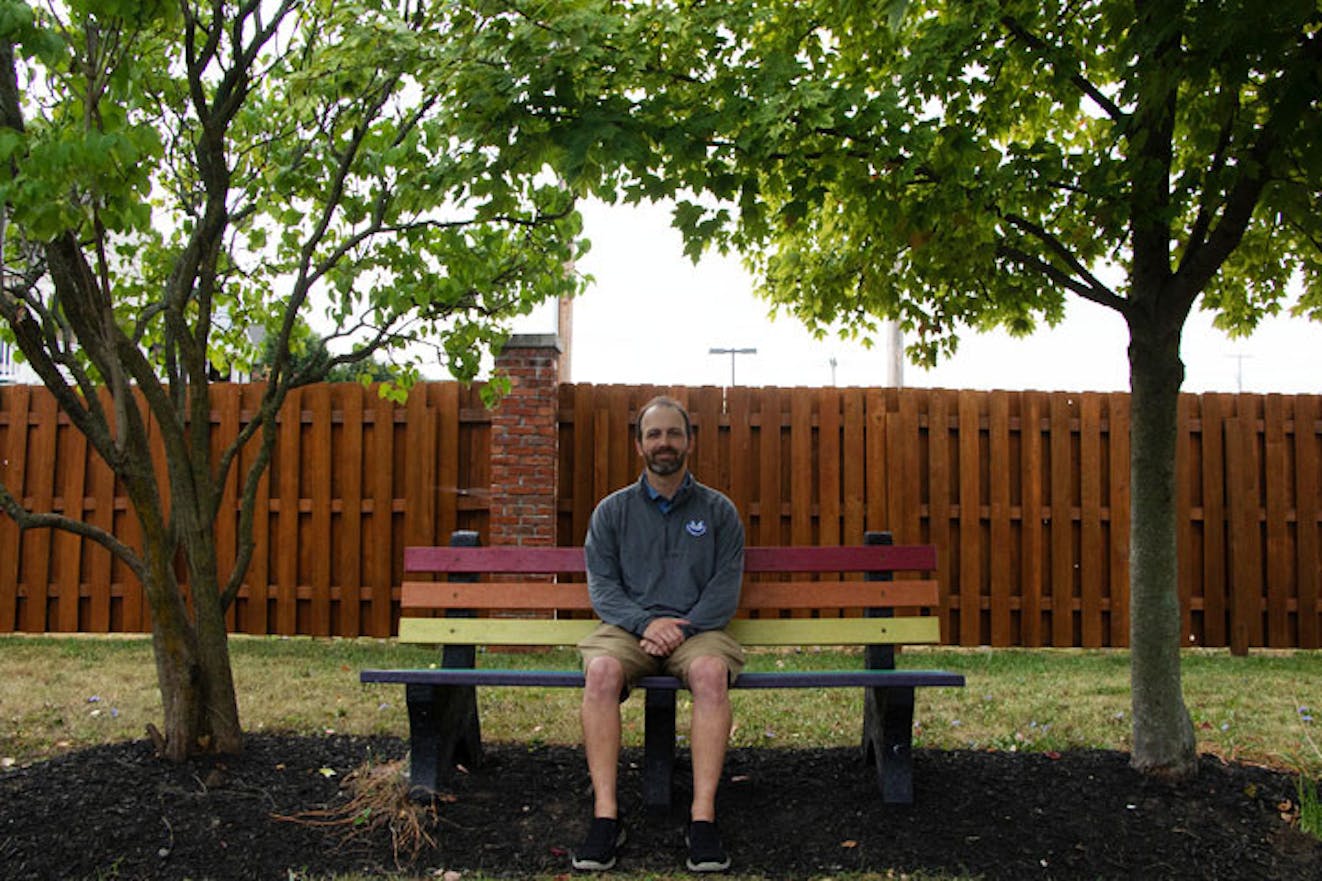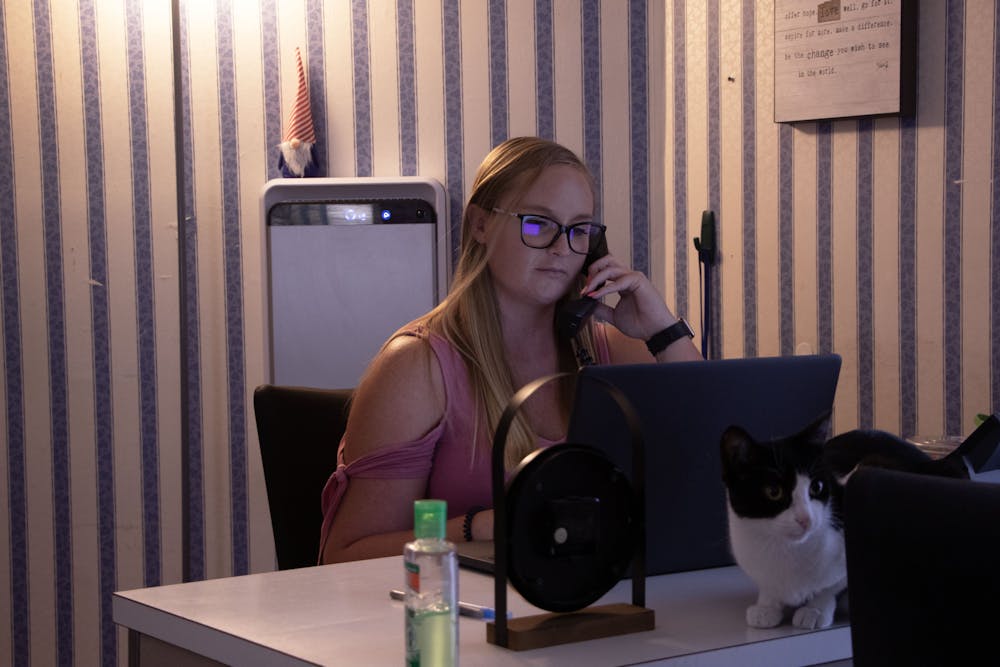In a house, turned office and call center, in downtown Muncie, there are six desks set in a room with blue and white striped walls and soft lighting. There is artwork and posters with phrases like “Be the Change.” Personal trinkets crowd monitors and sheets of paper. A small, black and white cat called Bobbie, named after a former longtime worker, jumps on desks and prowls around the computers and telephone base stations. The room is quiet.
Until a call comes in.
Students at Ball State have a new 24-hour option to be that caller when they are experiencing a moment of crisis: the 24/7 Crisis Hotline (765-285-4673).
Bill Betts, director of counseling and health services, said the move has been long in the making as his department has been looking into options for providing after-hours support.
“Before I was here, there was a number that students could call and they would reach a therapist on call from the Counseling Center,” Betts said. “So they could actually call … then we would call them back and talk with them. That system was never really designed to work like a crisis line where you call and get support. It was really to help intervene in concerning situations.”
The original system began to not be functional, Betts said, as the increase in the number of calls led to the on-call therapist calling back late in the night. The system was shut down before Betts arrived, but a solution came when funds became available through the university. The funds were put into the creation of the Crisis Hotline and other resources for students.
The suite includes efforts students can use online without ever having to go to the counseling center in person- aiming to make getting help more accessible.
“If we can intervene with those folks, and get them the things they need early on, maybe they aren't going to need therapy later,” Betts said. “This whole set of suite is [about] how do we get to all of campus and give them the services they need to support them?”
Calling a crisis line is an option for students at all stages of their mental health journey, but Betts said it should not be seen as a replacement for long-term care.
“My hope is that the crisis line gets people to get those long-term fixes,” Betts said. “For some folks, it's the first step because [students] hang on and hang on until they can't hang on anymore.”
The 24/7 Crisis Hotline is made specifically made for Ball State students, which sets it apart from similar helplines such as the national 988 number. While the Ball State line is still in its infancy, the success of the 988 hotline speaks to the need for such a service.
According to the Substance Abuse and Mental Health Services Administration (SAMHSA) website, “Since the July 2022 launch, 988 has received (routed) more than 6 million calls, texts, and chats.”
The SAMHSA website also claims, “Almost 98% of people who call, chat or text the 988 Lifeline get the crisis support they need and do not require additional services in that moment.”
Ball State’s crisis line is run in collaboration with a local 988 call center, which is part of the services for A Better Way Services, Inc. The service agency also works to reduce domestic abuse, sexual assault, suicide and homelessness.
Adam Reichle, crisis hotline supervisor and crisis operator, said student hotlines are important for a better university response to students in crisis.

“For a lot of universities, the first line of crisis response is usually law enforcement, especially if those crises happen after hours or counseling centers [are] closed,” Reichle said. “This allows us to help deescalate that individual … and not involve other systems that aren't necessary … unless that person or that person presents an imminent risk to themselves or others.”
Danielle Longenberger, a fourth-year psychology major and 988 operator, works at A Better Way. She is not a part of the Ball State crisis line, as the line includes no Ball State students in order to ensure the privacy of callers. However, as a student and operator, she can see both sides of the interaction and the importance of a hotline for students.
“I think that students having their own separate line is extremely helpful,” Longenberger said. “It's more focused, and being able to talk about what's been going on and just finding out strategies of how you can better help yourself. I think it's an awesome tool, and I think students should use it.
A point echoed by Reichle, who said the locality of the line was an important factor.
“One of the main differences is that we are on-site, we know this community,” Reichle said. “They're talking to someone who is familiar with the resources that are available to the students and familiar with a campus … [are] better able to help provide resources that are tailored. That's one benefit to the Ball State crisis line.”
In the A Better Way office, operators like Katie Madden sit at desks waiting for their next call. She has worked at the 988 line and currently works for the Ball State crisis line as an operator. The process is one where listening is the most important according to Madden and Reichle.
“Just letting the caller talk and asking open-ended questions so they feel more free to talk,” Madden said. “You don't want to push anything but also want to make sure they're safe. Letting them talk in the beginning [and] letting you know what's going on and then assessing for safety.”
For operators, the job is one with high reward and even higher stress, compassion and emotional fatigue. Reichle, as supervisor, has to go over calls for quality assurance and the experience is often full of both.
“It's difficult to listen to them a lot of times because that person is in such a desperate state that it can be difficult,” Reichle said. “Then by the end of it, I always wind up feeling really reconnected to the work that we do. When I hear that relief in that person's voice, I can see that they're going to be safe and that helps me to reconnect to my work and why I do it.
The operators also practice self-care, Reichle said, which can range from talking to other operators or, in Reichle’s case, spending time with his two young sons.
Madden said the crisis line provides a listening ear in a crucial moment for many students.
“I think it's important, talking about how they feel and kind of getting everything off their chest, even if it is suicide,” Madden said. “Sometimes just talking about it and being able to have somebody that understands on the other end is huge and can save a life. So I think it's extremely important to have it for students.”
Contact Abigail Denault with comments at abigail.denault@bsu.edu.


